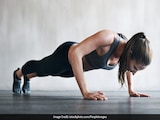Hypertension, also known as high blood pressure, is one of the leading causes of heart disease. Often referred to as a "silent killer," hypertension can go unnoticed for years while it gradually harms your body. Sedentary lifestyle and poor eating habits are two major contributors to high blood pressure, which has become increasingly common these days. When the force of blood against your artery walls is too high, it can cause damage to your arteries and organs, increasing the risk of heart disease, stroke, kidney disease, and other complications.
Most individuals resort to medications to maintain healthy blood pressure numbers. Making lifestyle changes, such as eating right, staying physically active, managing stress, and maintaining a healthy weight, are also known to promote stable blood pressure levels. If you are hypertensive, should you resort to medication or rely on lifestyle interventions? Let's know from the expert.
Can you manage blood pressure without medication?
While diet and lifestyle interventions can effectively lower blood pressure, some individuals may require medications, especially those with severe hypertension.
"In many people with mildly elevated blood pressure (pre-hypertension or early stage hypertension), lifestyle changes alone can significantly reduce blood pressure. However, in moderate to severe hypertension, medicines are usually required along with lifestyle modifications," said Dr. G Nasiruddin, Consultant - Internal Medicine, Fortis Hospital.
How to lower blood pressure naturally
1. Dietary changes
- Reduce salt intake: Decreasing sodium can have a positive effect on blood pressure.
- Eat a balanced diet: Focus on fruits, vegetables, whole grains, and lean proteins. The DASH (Dietary Approaches to Stop Hypertension) diet is recommended.
2. Weight management
Even a modest weight loss (5-10% of your body weight) can lower blood pressure significantly.
3. Stay physically active
Aim for at least 30 minutes of moderate-intensity exercise most days of the week. Activities like brisk walking, cycling, and swimming are excellent options.
4. Limit alcohol and quit smoking
Both smoking and excessive alcohol intake can raise blood pressure and increase cardiovascular risk.
5. Stress management
Practice relaxation techniques, such as yoga, meditation, or deep breathing exercises, to lower stress levels and blood pressure.
6. Sleep hygiene
Ensure you're getting adequate and quality sleep, as poor sleep can negatively affect blood pressure.
7. Limit caffeine (if sensitive)
For some people, caffeine can elevate blood pressure, so monitor your intake if you notice any reactions.
When should one consider taking medicine?
Dr. G Nasiruddin recommends taking medication in the following cases:
- If blood pressure is persistently 140/90 mmHg despite lifestyle changes
- If blood pressure is very high (160/100 mmHg) at diagnosis
- If you have other conditions like diabetes, kidney disease, heart disease, or a prior stroke
- If lifestyle changes alone fail after 3-6 months
Is it safe to manage hypertension at home?
"Mild cases (slightly above normal, e.g., 120-139/80-89) can usually be managed at home with lifestyle changes under a doctor's guidance. Regular monitoring at home with a digital BP machine is helpful."
"Never stop prescribed medicines on your own. If already on medication, discuss with your doctor before making changes. For very high readings (>180/120 mmHg) or symptoms like chest pain, shortness of breath, headache, or vision changes, seek emergency care," he added.
"Many people can lower blood pressure without medication through healthy lifestyle habits, but medicines are needed in moderate-to-severe cases or if risk factors are present. Always consult a doctor before deciding to avoid or stop medication," he concluded.
Regular monitoring of your blood pressure at home can help you keep track of your progress. Always consult with a healthcare professional before starting any new health regimen or if you have concerns about your blood pressure management.
Disclaimer: This content including advice provides generic information only. It is in no way a substitute for a qualified medical opinion. Always consult a specialist or your own doctor for more information. NDTV does not claim responsibility for this information.















